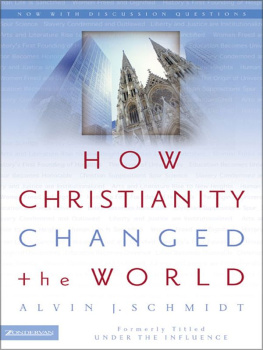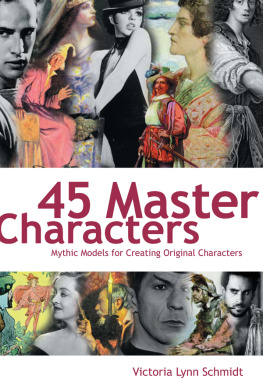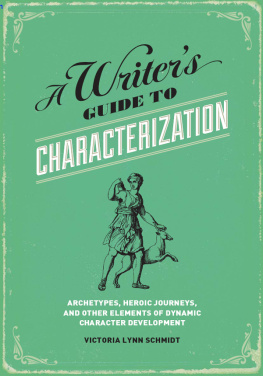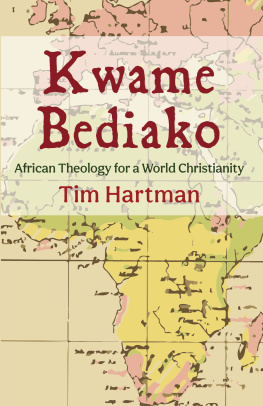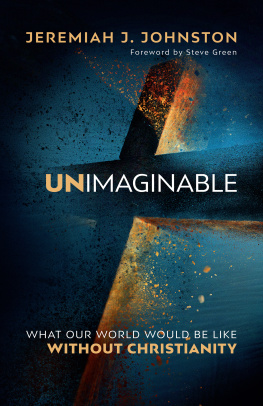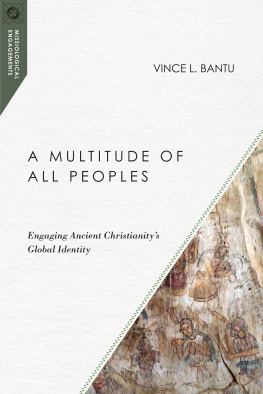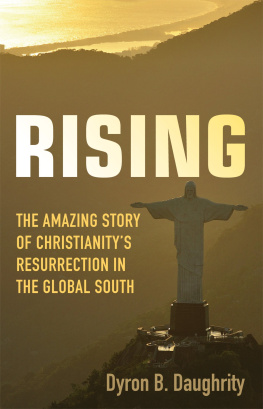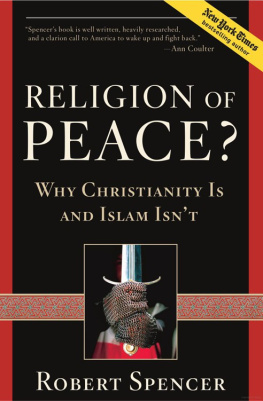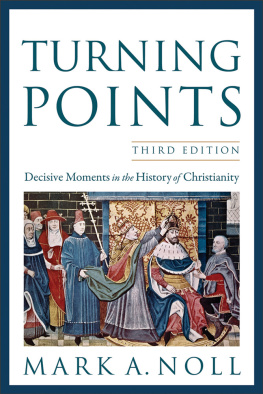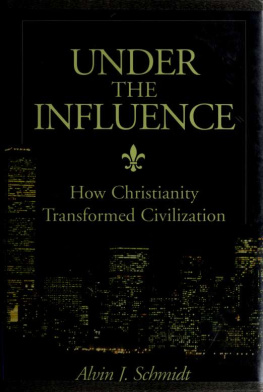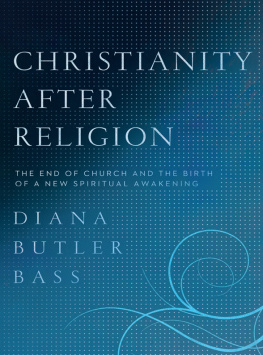With the increasing secularization of society and the current emphasis on multiculturalismespecially in matters religiousthe massive impact that Christianity has had on civilization is often overlooked, obscured, or even denied. For this and many other reasons, a powerful response is long overdue, not only in the interests of defending the faith, but more urgently, to set the historical record straight. This book delivers that compelling response.
No other religion, philosophy, teaching, nation, movementwhateverhas so changed the world for the better as Christianity has done. Its shortcomings, clearly conceded by this author, are nevertheless heavily outweighed by its benefits to all mankind. You will relish these pages as they unveil these benefits.
Paul L. Maier
from the Foreword
It has become fashionable in the academy and the public square either to ignore or to deny the positive results of Christianity. Professor Schmidts book instead offers a far more honest and realistic alternative. Reading this book is not only educational; it also is a fascinating inspirational experience.
David O. Moberg, Ph.D.
Professor of Sociology Emeritus,
Marquette University


A CHARITY HOSPITAL for children in London in the nineteenth century. (Gustave Dor)

ZONDERVAN
HOW CHRISTIANITY CHANGED the WORLD
Copyright 2001, 2004 by Alvin J. Schmidt
All rights reserved under International and Pan-American Copyright Conventions. By payment of the required fees, you have been granted the non-exclusive, non-transferable right to access and read the text of this e-book on-screen. No part of this text may be reproduced, transmitted, down-loaded, decompiled, reverse engineered, or stored in or introduced into any information storage and retrieval system, in any form or by any means, whether electronic or mechanical, now known or hereinafter invented, without the express written permission of Zondervan.
ePub Edition June 2009 ISBN: 978-0-310-86250-5
Requests for information should be addressed to:
Zondervan, Grand Rapids, Michigan 49530
Library of Congress Cataloging-in-Publication Data
Schmidt, Alvin J.
[Under the influence]
How Christianity changed the world: formerly titled Under the influence / Alvin J. Schmidt.
p. cm.
Originally published: Under the influence. Grand Rapids, Mich.: Zondervan Publishing House, 2001.
Includes bibliographical references and index.
ISBN-13: 978-0-310-26449-1
1. ChristianityInfluence. 2. Civilization, Christian. I. Title.
BR115.C5 S335 2004
270dc22
2004023959
All Scripture quotations, unless otherwise indicated, are taken from the Holy Bible: New International Version. NIV . Copyright 1973, 1978, 1984 by International Bible Society. Used by permission of Zondervan. All rights reserved. Other Scripture texts cited in this book are the King James Version (KJV), the New King James Version (NKJV), and the New Revised Standard Version (NRSV). Italics used in quotations of Scripture are added by the author for emphasis.
All rights reserved. No part of this publication may be reproduced, stored in a retrieval system, or transmitted in any form or by any meanselectronic, mechanical, photocopy, recording, or any otherexcept for brief quotations in printed reviews, without the prior permission of the publisher.
07 08 09 10 11 12 13 21 20 19 18 17 16 15 14 13 12 11 10 9 8 7 6 5 4
To my cherished sons,
Timothy John and Mark Alvin.
May they and their descendants
continue steadfastly in the apostles doctrine
as did so many of their Christian predecessors
since the time of Christ
CONTENTS
SUMMARY CHARTS
ILLUSTRATIONS
I n what some have called this post-Christian era, new books on Jesus of Nazareth regularly appear in which there is less Christ and more caricatureall in the name of supposed scholarship. As for the Christianity Jesus founded, there is a similar tendency either to ignore its contributions to our world or to stress negative aspects of church history that also developed whenever believers belied their beliefs. It has become politically correct to fault Christianity for authoritarianism and repression, a faith that promoted fanaticism and religious warfare while impeding science and free inquiry.
With the increasing secularization of society and the current emphasis on multiculturalismespecially in matters religiousthe massive impact that Christianity has had on civilization is often overlooked, obscured, or even denied. For this and many other reasons, a powerful response is long overdue, not only in the interests of defending the faith, but more urgently, to set the historical record straight. This book delivers that compelling response.
What If Jesus Had Never Been Born? by D. James Kennedy and Jerry Newcombe fired a fine opening salvo in the struggle to reclaim the massive heritage Christianity bequeathed civilization, but the present volume by Dr. Alvin J. Schmidt wins the battle. A now retired professor of sociology at Illinois College, Schmidt carefully documents how Christianity has dramatically improved our world across twenty centuries in so many varied facets of our culture.
Even knowledgeable believers will be amazed at how many of our present institutions and values reflect a Christian origin. Not only countless individual lives but civilization itself was transformed by Jesus Christ. In the ancient world, his teachings elevated brutish standards of morality, halted infanticide, enhanced human life, emancipated women, abolished slavery, inspired charities and relief organizations, created hospitals, established orphanages, and founded schools.
In medieval times, Christianity almost single-handedly kept classical culture alive through recopying manuscripts, building libraries, moderating warfare through truce days, and providing dispute arbitration. It was Christians who invented colleges and universities, dignified labor as a divine vocation, and extended the light of civilization to barbarians on the frontiers.
In the modern era, Christian teaching, properly expressed, advanced science, instilled concepts of political and social and economic freedom, fostered justice, and provided the greatest single source of inspiration for the magnificent achievements in art, architecture, music, and literature that we treasure to the present day.
These pages document it all, showing with meticulous care how so many of our current institutions originated and developed within the church, and how so many greats in all branches of human culture were Christian. The author carefully warns, however, that the current climate of secularism and pluralism is now fogging many of these facts. That is all the more reason for the reader to watch how this book dispels such mist in the name of historical truth.
Some moderns with no religious beliefs, of course, have high ethical standards and often show humanitarian concerns quite independent of Jesus teachings. Professor Schmidt, however, tellingly shows how such secular morality could hardly have been possible without a prior Judeo Christian ethic that influenced generation after generation. Any noble pagan today recoils, for example, from the thought of killing babies, but noble pagans of antiquity prior to Christianity did not so recoil.
For years, Christian apologeticsdefending the faithhas intrigued me, and I have used historical and archaeological tools to demonstrate how admirably the sacred evidence of Scripture correlates with purely secular evidence from the ancient world. Yet Professor Schmidts brilliant study has convinced me that the faith can also be splendidly defended on another front: its record of being the most powerful agent in transforming society for the better across two thousand years since Jesus lived on the earth.
Next page
